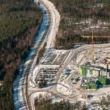Nuclear power’s limited usefulness and limited proliferation risk
By Shahriman Lockman, March 28, 2012
In some quarters the disaster at the Fukushima Daiichi Nuclear Power Station has prompted a reconsideration of nuclear energy — but in many developing nations with nuclear energy programs, the incident has had barely any effect. Bangladesh, Belarus, Turkey, and Vietnam are expected to start building their first nuclear power plants in the near future, and several other developing countries are likely to follow suit in subsequent years. But is nuclear power necessarily good for the economic development of these nations?
Proponents of nuclear power often tout its ability to meet the energy requirements of expanding economies; in fact, the link between nuclear power and economic development is tenuous at best. True, nuclear power plants are relatively cheap to fuel and operate — but they are notoriously expensive to build. As noted by Brazilian physicist José Goldemberg, any country with a gross domestic product of less than $50 billion probably cannot afford to purchase a nuclear reactor. (Many other developing countries, according to Goldemberg, make poor candidates for nuclear power because of their inadequate electrical grids.) Adding to the expense is that cost overruns have long been common in the nuclear industry: The 75 US nuclear power plants on which construction began between 1966 and 1977 experienced cost overruns averaging in excess of 200 percent. Furthermore, amid growing global demand for nuclear energy, the cost of materials and expertise required to build nuclear power plants has risen dramatically in recent years.
Despite these financial realities, nuclear power is regarded as an attractive energy option in a number of developing countries, particularly those that wish to enhance the security of their energy supply. As energy expert Daniel Yergin has observed, many developing countries equate energy security with the ability to safeguard their balance of payments against fluctuations in energy prices. Thus, a number of developing countries — enjoying only limited access to domestic energy resources, and acting in the expectation that prices for oil, natural gas, and coal will rise over the long term — have begun to contemplate the adoption of nuclear energy. In Malaysia, for example, interest in nuclear power is largely driven by the likelihood that, unless the country soon discovers new oil and gas resources (which is unlikely because of territorial disputes in the South China Sea), it will become a net importer of energy by the end of this decade. Concerns about supply security have likely influenced Vietnam and Bangladesh's decisions to adopt nuclear energy as well.
The thorny question. It is certain, then, that a number of developing countries will acquire nuclear reactors in the coming years. But will this necessarily increase the risk of nuclear weapons proliferation?
Arguing otherwise would be difficult. Still, the risk may not be severe enough to merit serious concern. It has been argued that even a tenfold increase in nuclear reactors would not have a significant impact on nuclear proliferation, and that the key issue in proliferation risk is not how many countries use nuclear power but how many rogue states are intent on developing nuclear weapons. Indeed nuclear reactors — especially the light water reactors that are now the industry standard — do not, themselves, present high proliferation risks. Rather, the danger comes from enrichment and reprocessing facilities, which generate fuel for reactors but could also produce weapons-grade fissile materials.
This raises a thorny question: whether countries that adopt nuclear energy should maintain their own enrichment and reprocessing facilities — in other words, whether they should develop their own fuel cycles. The Nuclear Non-Proliferation Treaty suggests that they have every right to do so, with Article IV recognizing an "inalienable right" to "nuclear energy for peaceful purposes." This powerful set of words is generally understood to encompass the entire fuel cycle.
Yet the overwhelming majority of countries that maintain nuclear power plants or plan to build them have demonstrated little interest in establishing their own enrichment and reprocessing facilities — not least because of the considerable investment required. These countries also recognize that new enrichment and reprocessing facilities place additional strains on the international community's capacity to monitor nonproliferation compliance. Therefore, they have preferred to purchase the fuel they require from external sources.
Even so, they have generally demonstrated a lukewarm attitude toward proposals for making the fuel cycle multilateral, whether these proposals entail fuel banks, multilateral management of facilities, or assurances of supply. Arrangements like these, some nations fear, would create an irreversible divide between supplier states and buyer states — in effect, an erosion of the rights established under Article IV of the treaty.
Ways forward. Even in the absence of a broad consensus on multilateral approaches to the fuel cycle, a host of measures is available to promote the peaceful use of nuclear energy. As outlined in a memorandum by the Council for Security Cooperation in the Asia Pacific, a network of regional nongovernmental organizations, these measures might include promoting effective export-control regimes to prevent nuclear technologies and materials from falling into the wrong hands. Another important step would be ensuring that the International Atomic Energy Agency has sufficient financial resources to conduct activities in technical cooperation, inspection, and enforcement.
More could also be done to cultivate a culture of safety and security in nations that adopt nuclear energy in the future. For instance, it is not enough for countries to train their law-enforcement officials to prevent, detect, and respond to illicit trafficking of nuclear materials. Officials must also be inculcated with a genuine appreciation of why proliferation needs to be prevented. In some developing countries, the risk of proliferation is regarded as the developed world's peculiar obsession rather than as a real threat to the nation's own security. That sort of attitude needs to be dispelled if the global nonproliferation regime is to remain effective in the long run.
Topics: Nuclear Energy, Nuclear Weapons
Share: [addthis tool="addthis_inline_share_toolbox"]














